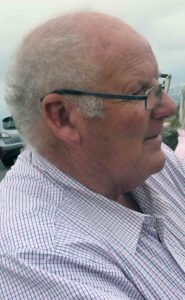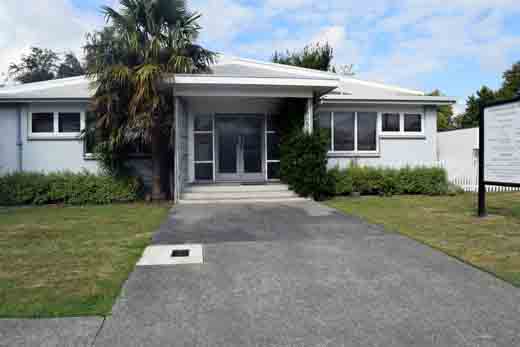Editor’s Note: This is the 18th in a series of stories researched during Don and Nancy Harrison’s 50th Wedding Anniversary cruise from Sydney, Australia, to San Diego. Previous installments of the series, which runs every Thursday, may be found by tapping the number of the installment: 1, 2, 3, 4, 5, 6, 7, 8, 9, 10, 11, 12, 13, 14, 15, 16, 17
By Donald H. Harrison


NAPIER, New Zealand – John McCormick, son of a Presbyterian sheep farmer from Waipukurau in New Zealand’s central North Island, can recite from experience the ups and downs of the troubled relationship between New Zealand and Israel in the 21st Century. A volunteer National Party activist, he has been in the forefront of pro-Israel advocacy in this nation of 4.5 million people.
In 2004, two Israelis were sentenced to six months imprisonment in New Zealand for entering the country illegally, amid heavily publicized rumors that they were agents of the Mossad, Israel’s spy agency. Israel sent a letter apologizing for the men’s conduct, saying it would take steps to make certain nothing like that happened again.
In 2011, following the destructive earthquake which leveled much of Christchurch, killing 185 persons in the process, fears about Mossad agents being illegally in New Zealand again rose to the surface. One of those killed was an Israeli backpacker, Ofer Mizrahi, who was found with multiple passports. Further, it was noted that within a day of the quake, Mizrahi’s Israeli companions had flown out of New Zealand, prompting speculation that he and they were part of a Mossad ring. An investigation by New Zealand’s Security Intelligence Service concluded that charges of a Mossad conspiracy had no merit.
In 2015, Israel declined to credential an ambassador from New Zealand because that same envoy was also credentialed to the Palestine Authority. Eventually, New Zealand decided to appoint an ambassador to each entity.
Another crisis hit in December 2016, when New Zealand, as a non-permanent member of the United Nations Security Council, voted to support Resolution 2334, declaring that the lands beyond the pre-1967 War boundaries occupied by Israel was done so illegally—including Jerusalem. That prompted Israel’s Prime Minister Benjamin Netanyahu to recall Israel’s ambassador to New Zealand for consultations, leaving its embassy in Wellington in the hands of a charge d’affaires, a comparatively low-ranking diplomatic officer.
This estrangement lasted until June 2017, when New Zealand’s prime minister Bill English sent a letter to Netanyahu expressing regret over the results from the resolution, which was approved by a vote of 14-0 with the United States, in the waning days of Barack Obama’s administration, having abstained from voting.
Amid such tensions, McCormick has done almost everything a layman can to improve the Israel-New Zealand relationship. For example, he religiously monitors three newspapers a day, one from Wellington, one from Auckland, and a third from the local Hawke’s Bay area, to make certain news about Israel is reported correctly. When the news isn’t accurate, he writes letters to the editors, explaining why corrections are necessary. Sometimes, he pens OpEd columns for the newspapers’ consideration. He suggests fellow New Zealanders, or “Kiwis,” as they call themselves, feel unnecessarily paranoid about the Mossad. “What possible interest would the Mossad have in New Zealand, so far away on the other side of the world?” he asks.
As a leader in New Zealand’s Friends of Israel group, and as a member of the New Zealand Institute for International Affairs, McCormick is a frequent advocate for Israel, which he has visited twice. At the Ein Gev kibbutz in 1977 and 1981, he learned about the country by volunteering at familiar farm skills including milking cows, agriculture, horticulture, shipping, irrigation, and driving tractors. He also learned while doing political chores in Britain, working for the Conservative Party’s Friends of Israel and the U.K. Zionist Organization. In New Zealand, the political operative has supported himself in a variety of jobs, including as a Mr. Apple quality control manager for apples bound for the United States. As New Zealand’s seasons are reverse from those of the United States, it can supply apples to the U.S. during America’s off-season.
While Nancy and I toured with McCormick through the Hawke’s Bay area, on a circuit that took us to such locales as Napier, Clive, Whakatu, Hastings, Havelock North, and the Te Mate peak, he told us that his love for Israel dates all the way back to Israel’s 1967 Six Day War, when he was a student at Scots College. He said he became fascinated by the similarities between Israel’s rapid conquest of the Sinai in that war, and the exploit of New Zealanders during World War II who rapid marched from Homs, Syria, to El Alamein, Egypt, where, by mistake, they bypassed German forces. Finding themselves behind enemy lines, they decided to march back, practically waving to the surprised Germans as they retreated to the established Allied positions.
McCormick said his father, a livestock broker who exported between 600,000 and 900,000 lambs a year, was a very good judge about who was a good farmer and who wasn’t. There were some men in the environs of Waipukurau who were not particularly adept as farmers, but who nevertheless received a lot of respect from his father and from other New Zealanders. The reason: they were among the troops that had raced to battle German General Erwin Rommel’s forces at El Alamein.
At Scots College, which Americans would call a high school, McCormick wrote a paper comparing and contrasting the Israeli dash across the Sinai with that of the Australians during World War II. His teacher, who had served in the British Army, was intrigued, and demanded that McCormick expand the 300-word essay. Ultimately, McCormick wrote a 25-page thesis, for which he received an A plus. In the process, he became a firm admirer of the Jewish state.
Israel’s Six-Day War coincided with the Vietnam War in which the United States and New Zealand were allied with others against the North Vietnamese and the Viet Cong. There were pro-war and anti-war demonstrations in New Zealand, as there were in the United States. McCormick firmly backed New Zealand’s role in the war. The more he became involved with these issues, the more attracted he became to the National Party, which has alternated in power with the Labour Party. For quick comparison purposes McCormick, an admirer of U.S. President Donald Trump, said the Nationals are similar to Republicans in the United States, and the Labour Party more closely approximates the Democrats. Of course, comparisons among these parties are not precise.
As McCormick told us about his life, he stopped at various points of interest, including the building that once housed the Hawke’s Bay Hebrew Congregation in the town of Hastings. Whereas there once was a fairly sizable population of Jews in the town, their grown children gradually moved to New Zealand’s four major cities—Dunedin, Christchurch, Wellington, and Auckland—where jobs were easier to find, McCormick informed us. Today the building houses a Christian Assembly Hall.

McCormick worked closely with two leaders of the National Party in particular: Derek Quigley and Sir Keith Holyoake. For Quigley, a fellow farm boy who became a Member of Parliament and a Cabinet Minister, McCormick used to campaign in a big double decker London-style campaign bus. He also knocked on doors, surveyed voters, made phone calls, and became generally invaluable as a volunteer. Sir Keith Holyoake, who eventually would become New Zealand’s prime minister and later its governor-general, was his local contact. “He had a great memory,” McCormick recalled. “There was nothing he couldn’t remember about things he had done in the past, or what the opposition did, or who he talked to overseas.” McCormick became branch chairman of the Young Nationals, and later became head of various geographic divisions of the party.
McCormick began drafting pro-Israel resolutions for consideration in committees and on the main floor of National Party conferences. “I used to make sure that I always had an MP or an elected chairman as my seconder and I got them through,” he said.
“One of the things I do,” he added, “is that I bring Israeli ambassadors to this part of the country. I don’t want them to make a quick speech and disappear back to Wellington; I want them to come for at least two or three days and then we work hard, making 10 to 15 appointments.”
He said that while Israel promotes itself as a high tech exporter, in this agricultural portion of New Zealand, Israel’s innovations in horticulture and agriculture are even more important selling points. McCormick said he took Israeli Ambassador Yosef Livne during a 2014 tour to companies that import Netafim products, including slow drip irrigation systems, to demonstrate how high Israel’s standing is with New Zealand farmers.
Among other stops arranged by McCormick was a speech before the local branch of the New Zealand Institute for International Affairs. “We have only 80 people for institute meetings but at the ambassador’s speech we had 250,” he related. “A lot of these people were businessmen. They didn’t do business with Israel but they did do business with the Gulf States. They had a complete gut fill of hearing about Israel from the Arabs; they wanted to hear about Israel from the horse’s mouth, so to speak.”
The year 2014 saw a war between Israel and Gaza, and the ambassador entertained questions about that. “He told how he didn’t like civilians being killed, but there wasn’t much choice,” given the location of Hamas’s rockets. “He answered a lot of questions straightforwardly. The local newspaper was there and we got three days of front-page coverage.”
Another diplomatic high point during that trip was Livne’s visit with the local authority of the Maoris, who are New Zealand’s indigenous people. In a meeting with the executive committee in the Hawke’s Bay Area, the Maoris decided to send two of its people to Israel, one to learn about Israel’s methods for water conservation; the other to learn about the reinvigoration of the ancient Hebrew language.
“The regeneration of the Maori language is very similar to the regeneration of Hebrew,” said McCormick. “The Maoris see the similarities to what they’ve done in the last 30 to 40 years.”
Livne’s visit was not without controversy. There were anti-Israel demonstrations on one side of the street, pro-Israel demonstrations on the other. A group of police were detailed to protect Livne and his party during his visit to the Hawke’s Bay area.
In 2016, when New Zealand voted for Resolution 2334, the National Party was in power. McCormick said the Foreign Minister Murray McCully failed to consult with the Cabinet before directing New Zealand’s U.N. delegation how to vote. Whereas McCully once was pro-Israel, according to McCormick, he changed after he retained “a very hostile advisor in the foreign affairs department.”
Citing the importance of Israel’s positive relations with Maori representatives, McCormick noted that New Zealand’s current foreign minister is Winston Peters, a former National Party leader who left to found a new party called New Zealand First. Of Maori descent, Peters is now deputy prime minister and foreign minister in coalition with Prime Minister Jacinda Arden of the ruling Labour Party.
*
Harrison is editor of San Diego Jewish World. He may be contacted via donald.harrison@sdjewishworld.com
Pingback: Dance, carvings, geysers high points of Maori village | San Diego Jewish World
Pingback: Name changes helped kiwifruit growers, architect | San Diego Jewish World
Pingback: Movies at sea enhance the cruise | San Diego Jewish World